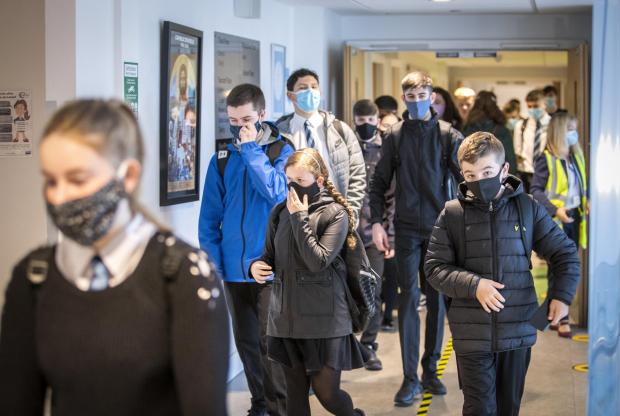Recommendations on learn how to assist your little one on the return to high school
There will have been mixed reactions from children and teenagers who have been told to go back to the classrooms next week.
For some kids, it’s a return to structure, seeing friends, social contact, a chance to stretch their wings – and for some parents, it’s a collective sigh of relief and they put the house back together and put the spinning plates back together from.
There’s another side; Children worried about returning, young people still afraid of Covid, worried about what the tests will look like, are afraid they will bring home a virus.
Likewise, there are parents who feel vulnerable, have not yet been vaccinated and worry about their health once schools return. All reactions to the pandemic are valid. There have been many divisions in our churches as we are all trying to find our way around a particularly dire time.
Young people returning may need support:
Watch out for changes
Children may be afraid of being left behind at work.
Sometimes children find it difficult to tell us how they are feeling, sometimes they don’t fully understand their own feelings and this can leave them confused and overwhelmed. Changes in behaviors such as sleeping patterns, eating habits, and changes in your normal behavior can let you know that you will find this readjustment difficult.
Help them connect with their feelings
It is very common for children and teenagers not to know exactly what they are feeling. When feelings have difficulty reconciling with the descriptive words, there is a feeling of confusion and overwhelming feeling.
Helping a young person connect feelings and words is a really important part of developing a “calming system”. If you notice that they are behaving differently, you can give them a guess – does it feel like this? Could you be worried about this?
The more you develop the ability to interpret your own feelings, the better your mental and emotional health will be in the future. A young person may not realize that they are afraid to return to school and help them connect with it as an opportunity opens the door to deeper connection and open conversation.
Talk to the school
 Some children may be afraid of going back to school next week.
Some children may be afraid of going back to school next week.
For many young people, school was tough even before the lockdowns. As an adult, it’s sometimes easy to forget the fear of peer relationships, hacking jobs, and academic pressures. Young people report concerns about their trust in protective measures in schools, they share concerns that friendship groups may have moved on, some report that their fear of the lockdown has increased so much that it now feels overwhelming to go outside and share with them People interact.
If you know your child is struggling with their mood, relationships with peers, or other emotional health issues, speak to the school. Schools have spent months thinking about how best to support the mental health of their students when they return and there will be support to help you and your child adapt.
start now
Get your child used to thinking about going back to school and talk to them about the routine they will return to. Adjust any wake up times that crept in later than usual and encourage earlier bedtime routines to fit them into the structure and routine of going back.
Anecdotally, I’ve heard from many parents that their kids struggled with the amount of work they had to do at home in Lockdown 3. Inquire about how good your young person is feeling. Going back to school worrying that the job isn’t done is a fear they could pass up.
Take care of oneself
In some ways, the problems our young people face are often a good litmus test for our adult populations. Many of us are eager to go back to normal and open pubs, shops, and restaurants while others have adjusted to indoor living. As we shrink our social world, opening it again can create feelings of fear.
We have lived with so much uncertainty and seen an overwhelming number of deaths, job losses and financial stress. It is only natural to have some concern when we open up again. It is difficult to give children and young people the reassurance and foundation they need to return when we are struggling with ourselves. Take a moment to listen to your feelings about relaxation and give yourself space and support when you need it. This can be a great way to mentor your young people.
I really hope we haven’t taken good action, but I absolutely recognize the mental challenges people face in getting back to normal.
All best wishes
Kirsten
Kirsten Antoncich FRSA
Psychotherapist and neurofeedback practitioner


Comments are closed.